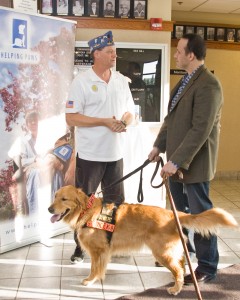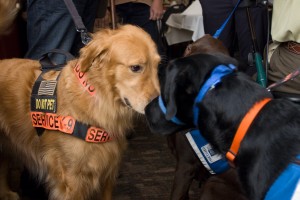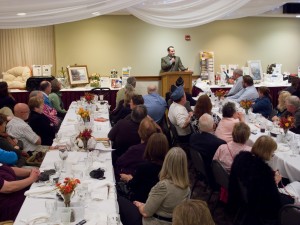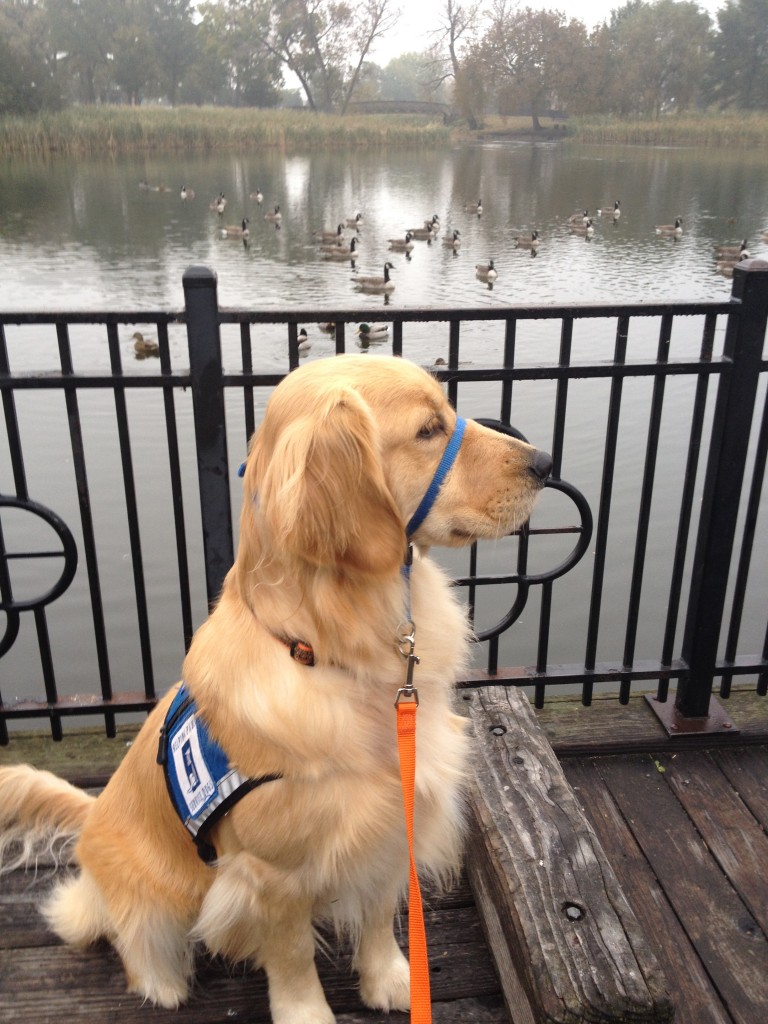I just read Luis Carlos Montalvan’s memoir, Until Tuesday. Luis is a veteran with chronic physical injuries and PTSD. Tuesday is his service dog. Some of you have probably met Luis and Tuesday, and more of you have probably read Until Tuesday. In 2012, Luis and Tuesday were the guests of honor at a Helping Paws fundraiser for their PTSD dogs pilot program (photos by Scott Stillman). And if you read the Helping Paws newsletters, you probably already know that Until Tuesday was an inspiration for the program (read story #4). I’m afraid I was unable to attend the fundraiser and have not met Luis or Tuesday, but I feel like I know Tuesday thanks to the memoir.
Until Tuesday is a quick, enjoyable read. I found myself thinking “just one more chapter before I get up and do blank.” That said, Luis writes about some pretty awful things, like the attempt on his life in Al-Waleed, and some serious things, like his insistence that the US military take responsibility for the people it sends to war. He is honest about his own troubling past, like self-medicating with alcohol, falling out with his parents, and coming to terms with the fact that he has a disability. There were times I put down the book so that I could absorb what I had just read about some troubling realities, from a young military couple facing medical restrictions mandated by their insurance company to water boarding detainees in Iraq.
Despite this being a memoir about struggle and disillusionment, it is enjoyable, because it is also a memoir about hope and love. Luis strikes a remarkable balance between light and dark, so that at no point did I feel the dark material was more than I could handle facing. Perhaps the secret here is that he opened with Tuesday as a puppy. And I knew going into the book, as any reader would, that the outcome would be uplifting. Open with puppy, close with uplifting image of best friends: hard to beat that combination.
Clearly, Luis is an activist. I engaged with his message and never felt he was preaching to me. I think that is because he was sharing a narrative of personal experience–a lot of raw, deeply moving personal experience. If he had told me a lot of statistics or distanced himself from his message, using abstractions, he would have lost me. But he didn’t, and I cared through the entire book.
Now, I titled this post Until Tuesday and Seva. How does Seva fit in here?
Tuesday and Seva are a lot alike. I mean, peas in a pod.
Tuesday knew all the commands, but was described as immature. For example, in this retrieving exercise, “He didn’t have trouble identifying the right object, but after a few runs he couldn’t help taking a victory lap around…the room.”
Seva likes to prance and shake the object in her mouth on the way to delivering it, her version of the victory lap.
Tuesday used to bring Luis his socks. Tuesday “loved to wrestle with them on the way back from retrieving them, and half the time [Luis] delicately slid slobber-covered socks into [his] desert combat boots.”
Whenever Seva performs Tug to remove a sock, she first uses the tips of her teeth, lips pulled back, to nibble at the sock until she gets a grip without biting toes, then she leans back and pulls. Once the sock is off, she can’t just put it in my hand. She has to gobble it into her mouth and then prance it over to me and regurgitate it into my hand, making certain it is good and slobbery. I don’t know why socks are so irresistible, but I’m glad it’s not just Seva.
Luis describes how Tuesday walks slightly ahead of him, which was a negative during training, but is beneficial to Luis because Tuesday provides a buffer in crowds.
Guess who else likes to be out in front? I often ask Seva, “Hey, who’s driving this boat?”
“Tuesday does his happy dance, ducking his front half and raising his behind and sort of pounding his head and shoulders into the rug with a scrape and a wiggle, first one side and then the other…It is energetic, goofily joyful, and mesmerizing.”
Yep. Seva does that all day long.
One day, if Seva’s person wants to know what Seva’s life and training were like before graduation, he or she will only have to look here. I am grateful Luis documented his journey with Tuesday. I don’t know what Seva’s person will need from her, but it was meaningful to read about Luis’s experience bonding with Tuesday and how that dog changed his life. It is such a remarkable thing, what these dogs do.
I sometimes wonder if Seva will make it. She knows her skills, is super smart, enthusiastic, and loving. She’s also “immature.” Like any mom, I worry about sending her out into the world. Reading about Luis and Tuesday brought home the fact that it is really about the match between human and dog. When the time comes, I’m sure the right person will be there to match with Seva.
I’ll leave you with one more thought. I realized, while reading Until Tuesday, that Seva won’t fulfill her service dog potential with me. I don’t need her the way her person will. I don’t need her to monitor my anxiety. I don’t need her for balance. I don’t need her to pick up dropped keys. I pretend I need her for all sorts of things when we’re training, but it’s not the same. I believe that the dog, once matched with the person who truly needs her, will respond to that need. And that is when Seva will achieve her full potential.




